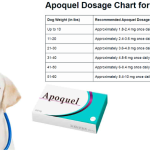Cytopoint is a popular medication used to treat allergic skin conditions in dogs. While it can be an effective treatment option, it’s important to understand its potential side effects and adverse reactions. As a responsible pet owner, it’s your responsibility to be informed about your furry companion’s health and safety.
- Cytopoint is a medication used to treat allergic skin conditions in dogs.
- It’s important to be aware of the potential side effects and adverse reactions.
- As a responsible pet owner, you should be informed about your dog’s health and safety.
In this section, we’ll provide an overview of Cytopoint side effects in dogs. We’ll explore the risks associated with Cytopoint, how it works, and what to expect during treatment.
What is Cytopoint and How Does it Work?
Cytopoint is a medication that is commonly used to treat allergies in dogs. It is an injectable drug that contains a monoclonal antibody, which helps to reduce the itchiness and discomfort associated with allergic reactions.
The active ingredient in Cytopoint is lokivetmab, which specifically targets a protein called interleukin-31 (IL-31). IL-31 is known to play a key role in the development of allergies in dogs, and by blocking its activity, Cytopoint helps to alleviate symptoms.
The drug typically starts to work within 24 hours of administration, and its effects can last for up to 4-8 weeks, depending on your dog’s response. Cytopoint is considered a safe and effective treatment option for many dogs with allergies.
How Does Cytopoint Compare to Other Allergy Medications?
Cytopoint is different from other allergy medications, such as steroids and antihistamines, because it targets the underlying cause of the allergic reaction rather than just the symptoms. Additionally, because it is an injectable medication, it does not require daily administration as many other allergy medications do.
While Cytopoint may not be suitable for all dogs with allergies, it is often used as a first-line treatment option due to its effectiveness and safety profile.
Benefits of Cytopoint for Dogs
Cytopoint has several benefits for dogs with allergies. Firstly, it can provide quick relief from the uncomfortable symptoms of allergies, such as itching and scratching. This can greatly improve your dog’s quality of life and prevent complications, such as self-inflicted injuries and infections.
Additionally, because Cytopoint is a targeted therapy, it does not have the same broad-spectrum effects as other allergy medications, which can sometimes cause unwanted side effects. This makes it a safe and well-tolerated treatment option for many dogs.
Overall, Cytopoint is an effective and safe medication that can greatly benefit dogs with allergies. However, it is important to be aware of the potential side effects and risks associated with this drug, which we will discuss in the following sections.
Potential Side Effects of Cytopoint in Dogs
Cytopoint, like any other medication, carries potential side effects that dog owners should be aware of. Although this treatment is generally considered safe and well-tolerated in most dogs, some adverse reactions may occur after administration. Immediate side effects are uncommon but can occur in some dogs. On the other hand, long-term side effects are not yet fully understood. It is important to discuss potential side effects with your veterinarian before starting Cytopoint treatment.
Cytopoint injection side effects: After receiving a Cytopoint injection, dogs may experience itchiness, vomiting, diarrhea, lethargy, and decreased appetite. Although rare, dogs may also develop more severe reactions such as anaphylaxis, a severe and potentially life-threatening allergic reaction. Owners must monitor their dogs closely for any signs of anaphylaxis, including difficulty breathing, facial swelling, and collapse.
Cytopoint side effects long term: Cytopoint has not been used for long enough to fully understand the potential long-term side effects in dogs. However, studies have shown that some dogs may develop adverse reactions over time. These may include infections, such as urinary tract infections and skin infections, or mild gastrointestinal problems, such as vomiting and diarrhea. Dogs with a pre-existing medical condition such as liver or kidney disease may also be at higher risk of developing side effects.
Cytopoint safety in dogs: Cytopoint has been tested extensively in clinical trials and is considered safe for use in most dogs. However, like any medication, it is important to use it cautiously and under veterinary supervision. Dogs with a history of allergic reactions to other medications should be monitored closely after receiving a Cytopoint injection. It is essential to follow the dosing instructions and not administer more than the recommended dosage.
Owners must be aware of any potential side effects of Cytopoint and what to do if their dog experiences any adverse reactions. If a dog displays any concerning symptoms, such as unexplained fatigue, vomiting, or diarrhea, the veterinarian should be contacted immediately.
Adverse Reactions to Cytopoint
Cytopoint is generally well-tolerated by dogs, but adverse reactions can occur in some cases. These reactions are typically mild and resolve on their own within a few hours to a few days after treatment. However, in rare cases, more severe reactions may occur.
The most common adverse reactions to Cytopoint include:
- Vomiting
- Diarrhea
- Itchiness or hives
- Lethargy or decreased energy
If you notice any of these symptoms in your dog after receiving Cytopoint, it is important to monitor them closely. While most dogs will recover quickly, some may require veterinary care.
In rare cases, more severe reactions may occur, such as:
- Difficulty breathing
- Swelling of the face, lips, or tongue
- Seizures or tremors
- Unusual bleeding or bruising
- Loss of consciousness
If your dog experiences any of these more severe reactions, seek veterinary attention immediately. These reactions can be life-threatening, but prompt treatment can increase the chances of a positive outcome.
Remember, while adverse reactions to Cytopoint can occur, they are generally rare. By being aware of the potential risks and monitoring your dog closely after treatment, you can help ensure their continued health and well-being.
Evaluating the Risks of Cytopoint in Dogs
Before using Cytopoint for your dog, it is important to evaluate the potential risks associated with this medication. While Cytopoint is generally safe and effective, it may cause side effects in some dogs.
Dogs with certain medical conditions, such as liver or kidney disease, may be more susceptible to adverse reactions to Cytopoint. Additionally, some dogs may experience an allergic reaction to the medication, which can be potentially life-threatening.
It is important to note that the long-term effects of Cytopoint are not fully understood, as the medication has only been on the market for a few years. While no serious long-term side effects have been reported, dog owners should monitor their furry companions closely for any changes in behavior or health.
Overall, the risk of side effects from Cytopoint treatment is relatively low. However, it is crucial to discuss any concerns or considerations with your veterinarian before starting your dog on this medication.
Cytopoint Reactions in Canines
As with any medication, Cytopoint can cause a range of reactions in dogs. Understanding the potential reactions can help you recognize the signs and take necessary action to ensure the health and safety of your furry friend. Here are some common reactions that can occur after receiving a Cytopoint injection:
Injection Site Reactions
- It is common for dogs to experience mild reactions at the injection site, such as redness, swelling, or itching. These reactions usually subside within a few days and can be managed with over-the-counter anti-inflammatory medications or cold compresses. However, if the reaction persists or worsens, you should contact your veterinarian immediately.
Gastrointestinal Reactions
- Dogs may experience gastrointestinal reactions after receiving a Cytopoint injection. This can include vomiting, diarrhea, and decreased appetite. These symptoms may be mild, but in some cases, they can be severe and lead to dehydration. If your dog experiences these symptoms, you should monitor their condition and contact your veterinarian if the symptoms persist or worsen.
Behavioral Changes
- Cytopoint can also cause behavioral changes in dogs. Some dogs may become lethargic or exhibit signs of depression. Others may become hyperactive or restless. If you notice any significant changes in your dog’s behavior after receiving Cytopoint, you should contact your veterinarian.
If your dog experiences any severe reactions such as difficulty breathing, facial swelling, or seizures, seek immediate veterinary attention. These are rare occurrences, but it’s important to be aware of the possibility of a severe reaction.
Cytopoint Allergies in Dogs
While Cytopoint is a popular treatment for allergies in dogs, it can cause allergic reactions in some canines. Dog owners must be aware of the signs and symptoms of Cytopoint allergies and take necessary precautions to minimize the risk of adverse reactions.
Symptoms of Cytopoint allergies may include:
- Difficulty breathing
- Itching or scratching
- Rash or hives
- Vomiting or diarrhea
If you notice any of these symptoms in your dog after receiving Cytopoint treatment, it is important to seek veterinary attention immediately. Allergic reactions to cytopoints can be life-threatening if left untreated.
To minimize the risk of allergies, it is recommended to administer a small test dose of Cytopoint before the full treatment. This test dose can help determine if your dog is likely to have an allergic reaction to the medication. Additionally, it is crucial to inform your veterinarian of any previous allergies or adverse reactions your dog may have had to medications in the past.
As with any medication, it is important to closely monitor your dog’s health after receiving Cytopoint treatment. By being aware of the signs and symptoms of allergic reactions and taking necessary precautions, you can help ensure the safety and well-being of your furry companion.
Managing Cytopoint Treatment Side Effects
While Cytopoint is generally safe and effective, it’s not uncommon for dogs to experience side effects after treatment. Some of the most common side effects include lethargy, vomiting, and diarrhea. These effects are typically mild and should resolve within a few hours to a few days.
If your dog is experiencing discomfort or side effects due to Cytopoint treatment, there are several steps you can take to alleviate their symptoms:
- Offer plenty of water: Dogs may become dehydrated due to vomiting or diarrhea. Make sure they have easy access to clean water and encourage them to drink frequently.
- Adjust their diet: Avoid feeding your dog any foods that may cause gastrointestinal upset, such as fatty or spicy foods. Instead, offer a bland diet consisting of boiled chicken and rice.
- Monitor their behavior: Keep a close eye on your dog’s behavior and look for signs of distress. If they appear to be in pain or discomfort, contact your veterinarian for further guidance.
- Be patient: In most cases, side effects should resolve on their own within a few days. Be patient and give your dog time to recover.
If your dog’s side effects are severe or persistent, contact your veterinarian immediately. They may recommend additional treatment or further evaluation.
Safety Precautions and Considerations
Cytopoint is generally considered safe for use in dogs, but it is still crucial to take some precautions to minimize the risk of adverse reactions. Your veterinarian will provide specific instructions regarding dosage and administration, but here are some general safety considerations to keep in mind:
- Make sure to inform your veterinarian if your dog is on any other medications or has any underlying health conditions. This information can help your vet determine the most appropriate course of treatment.
- If your dog has a history of allergic reactions, let your vet know before starting Cytopoint treatment.
- Follow the dosage and administration instructions carefully. Do not give your dog more than the prescribed amount, and do not administer Cytopoint more frequently than recommended.
- Watch for any signs of allergic reactions or adverse effects after administering Cytopoint. These may include vomiting, diarrhea, lethargy, or swelling around the injection site.
- Do not use Cytopoint in dogs younger than 12 months of age or in those that are pregnant or nursing.
By following these safety precautions, you can help ensure the health and well-being of your furry companion while using Cytopoint to manage their allergies.
Discussing Cytopoint with Your Veterinarian
If your dog is experiencing allergies, it is essential to discuss possible treatment options with your veterinarian. Cytopoint is a medication that can be effective in managing allergies in dogs. However, it is crucial to have an open and honest discussion with your vet about the potential side effects and risks associated with this medication.
Your veterinarian can provide personalized advice and guidance tailored to your dog’s specific needs. They can also help you evaluate the risks and benefits of Cytopoint treatment for your furry companion. By working together with your vet, you can make the best decisions for your dog’s health.
During your discussion with your veterinarian, be sure to ask any questions you may have about Cytopoint and how it works. Additionally, inform your vet of any other medications or treatments your dog may be receiving, as this can affect the safety and efficacy of Cytopoint.
Remember that your veterinarian is your partner in ensuring your dog’s health and well-being. By having an open and informed discussion about Cytopoint and other potential treatment options, you can make the best decisions for your furry companion.
Alternative Options for Allergies in Dogs
While Cytopoint is a popular option for managing allergies in dogs, it’s essential to explore alternative therapies as well. Some dogs may not respond well to Cytopoint or may experience adverse reactions. Additionally, some pet owners may prefer to try a more natural approach before turning to medication.
- One alternative option for managing allergies in dogs is a change in diet. Certain foods can trigger allergies in dogs, and switching to a hypoallergenic or limited-ingredient diet may help alleviate symptoms.
- Another alternative is the use of supplements such as omega-3 fatty acids and probiotics. These supplements can help boost the immune system and reduce inflammation, which can be helpful for dogs with allergies.
- Acupuncture and herbal remedies are also options that some pet owners may consider. While the effectiveness of these treatments is not scientifically proven, some pet owners have reported positive results.
In conclusion, while Cytopoint can be an effective option for managing allergies in dogs, it’s essential to explore alternative therapies as well. Discussing these options with your veterinarian can help you make an informed decision regarding the best treatment approach for your furry friend.
Conclusion
In conclusion, Cytopoint can be an effective treatment option for allergies in dogs. However, dog owners must understand the potential side effects and risks associated with this medication. By being well-informed and working closely with your veterinarian, you can make the best decisions for your furry companion.
- Monitor for Adverse Reactions: Keep a close eye on your dog for any negative reactions to Cytopoint and consult your vet if any issues arise.
- Manage Side Effects: If your dog experiences discomfort or side effects from Cytopoint, discuss symptom management strategies with your veterinarian.
- Consider Allergy Alternatives: Explore other allergy treatments like immunotherapy or dietary adjustments to find the best fit for your dog’s condition.
- Open Veterinarian Communication: Ensure you maintain clear and open communication with your vet to address any Cytopoint concerns or questions.
- Collaborative Care Approach: Work closely with your veterinarian to make informed decisions for your dog’s allergy treatment, prioritizing their health and comfort.










